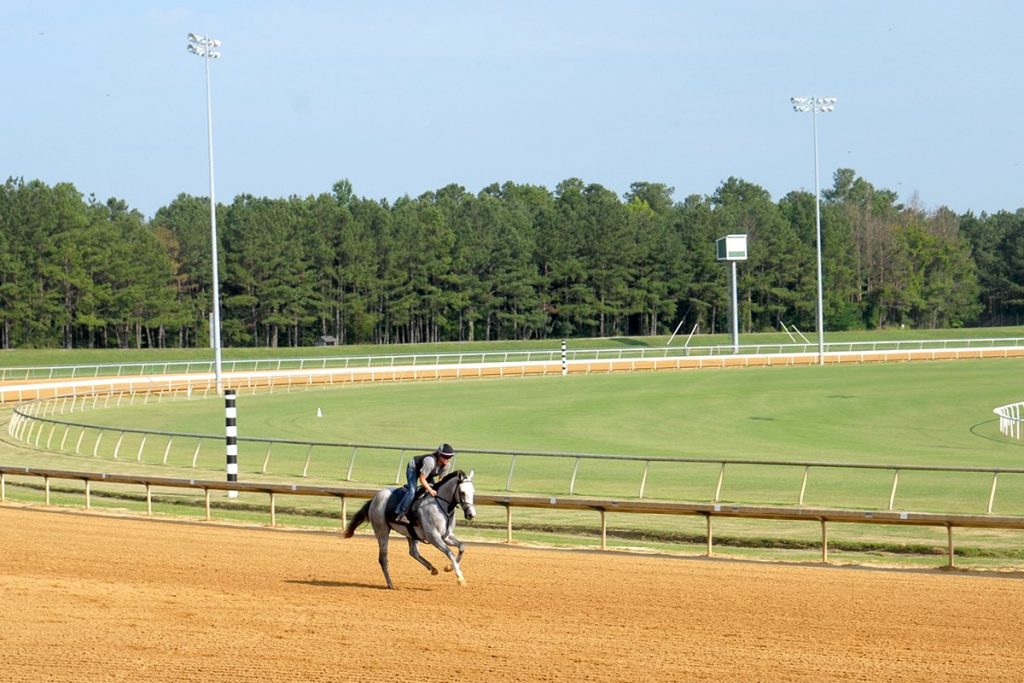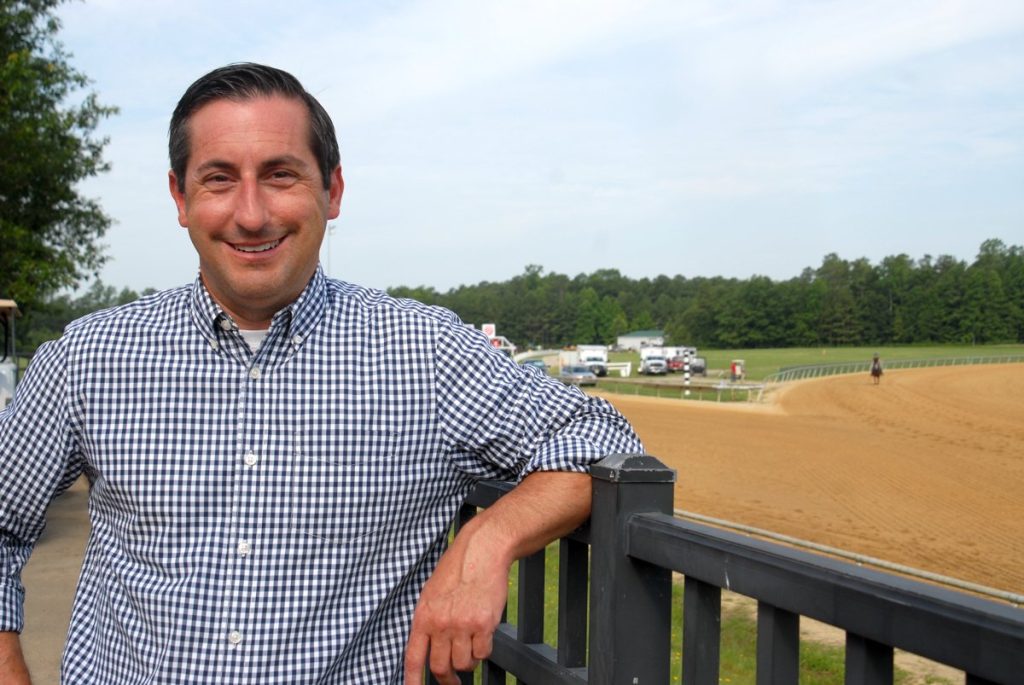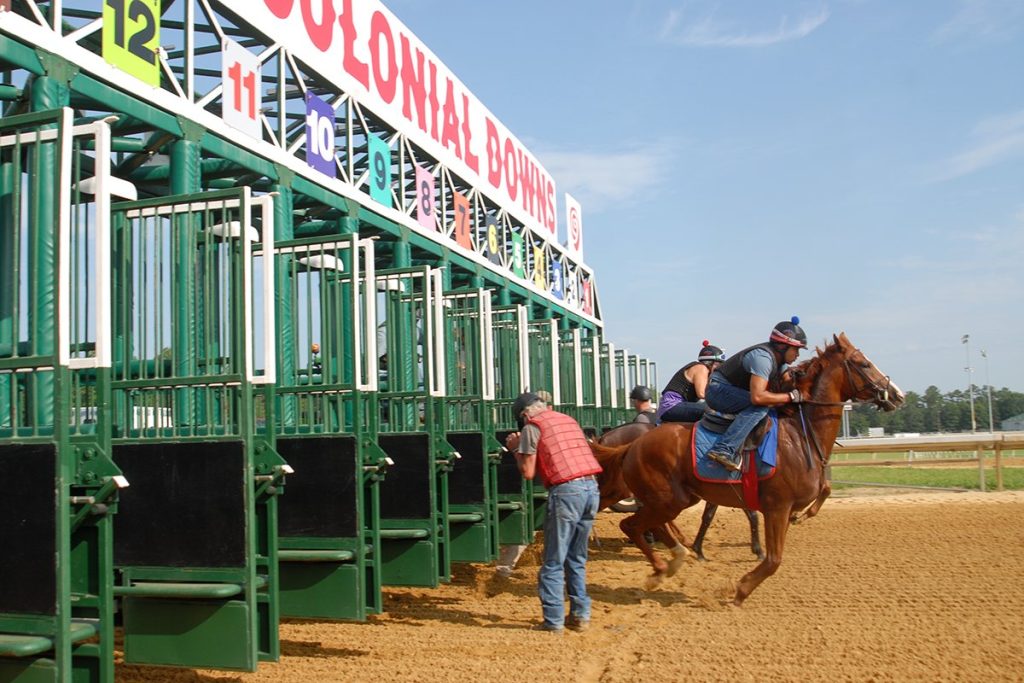The following appeared in Richmond Magazine and was written by Claire Fortier who took photos as well.
July 23, 2023
From George Washington pitting his best breed of horses against Thomas Jefferson’s to the spectacular Triple Crown victory of Doswell-born Secretariat in 1973, horse racing has a legendary history in Virginia. Now that legend is about to get a leg up.
Colonial Downs, purchased in November by Churchill Downs Incorporated, the company that runs the Kentucky Derby, is the new home for three renowned races: the Arlington Million, Beverly D and Secretariat Stakes, which took place for many years at now-shuttered Arlington Racecourse in Illinois. Scheduled for Saturday, Aug. 12, and offering purses as high as $1 million, the three stakes races will attract “some of the fastest and best horses in the country and the world,” says Mark Hubbard of McGuireWoods Consulting, whose organization was critical in lobbying the Virginia General Assembly to bring back thoroughbred racing in the commonwealth.

The races will highlight the biggest year yet for Colonial Downs. Two changes — moving races from the middle of the week to Thursdays, Fridays and Saturdays and extending the racing season to a nine-week schedule — are part of a push to make Colonial Downs one of the foremost summer racetracks in the country.
Landing a stakes race is a huge leap toward that goal. There is an elaborate rating system for horse races based on a statistical analysis of the quality of the horses running and the size of the purse for winners. At the pinnacle are Grade 1 races including the Kentucky Derby, the Preakness Stakes, and both the Arlington Million and Beverly D. The Secretariat Stakes is a Grade 2 race, and the New Kent County Virginia Derby on Sept. 9 is a Grade 3 race. The draw of Grade 2 and 3 races is that winning horses could become contenders on the sport’s biggest stages.
“It’s very exciting for any racetrack to have a graded race,” says Frank Hopf, senior director of racing operations for Colonial Downs. “It’s even more exciting to have the opportunity for two Grade 1 races and a Grade 2 race. The big key is to make sure we are getting top-quality horses here to run.”
Finding high-quality contenders is part of Hopf’s job. Hired in March after 13 years at Sam Houston Race Park in Texas, Hopf oversees all racing operations, as well as managing relationships with equestrian groups in Virginia.

“Part of the excitement,” Hopf says of his new role, “was to take what has already happened here and use that to become one of the premier summer tracks in the country, on the same level as Saratoga [in New York] and Delmar [in California].”
“Frank is here to help us build,” Hubbard says. “When we started this whole project to reopen Colonial Downs, it was all about revitalizing the horse industry in Virginia. We are actually watching that happen, and the continued growth is going to further accomplish that goal.”
Originally opened in 1997, Colonial Downs stopped thoroughbred racing in 2013 due to a dispute between track management and equestrian groups over the length of the racing season and proceeds from track betting. In 2018, the General Assembly enacted a law allowing historic racing machines (similar to slot machines) at the track and at off-track betting parlors. That fostered the economic viability to reopen the track. A Chicago-based partnership bought the track and on Aug. 8, 2019, held the first race in six years. Last fall, Churchill Downs purchased Colonial Downs and all of its gaming assets.
For Karen Dennehy Godsey, that’s great news. “This is our home track,” she says, sitting astride her pinto, Tonka, and watching an early morning exercise session on the track. “It’s the best turf track in the country and one of the best dirt courses as well. My horses do very well on it.”

Godsey, with her mother, Donna Gilman Dennehy, owns and operates Eagle Point Farm, a 200-acre thoroughbred training center in Ashland started in 1947 by her grandfather, T. Edward Gilman. Mother and daughter have extensive experience training racehorses, as well as advocating for Virginia-bred horses.
“I love it when a local homebred comes down here and does well,” Godsey says of Colonial Downs. “I have a couple of homebreds with generational history — horses that have run here, and now I have their foals running here. A lot of my clients love running their horses here as well. I had one client with a really nice filly who we wanted to take to a race on another track, but she declined. She said she loves this meet and wants to save her horses for it.”
Another goal at Colonial Downs is to broaden the appeal of horse racing to the public. “Horse racing is a niche sport,” Hubbard says. “What you have out here is a mixed audience of real horse-racing lovers who are here for the sport and those folks who pick their horses based on the color [the jockeys] are wearing or if the horse has an interesting name.”
With a new food concessionaire and more fun activities on Saturdays, Colonial Downs is trying to appeal to the whole family. “My goal is to have the guest experience be as good as it can be,” Hubbard says. “This is a great way to spend an afternoon and do something different. It’s a blast.”

